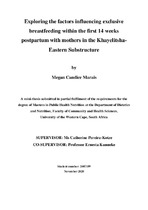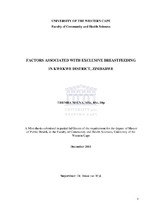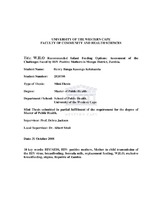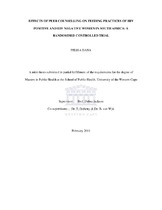Exploring the factors influencing exclusive breastfeeding within the first 14 weeks postpartum with mothers in the Khayelitsha-eastern substructure
Abstract
Despite evidence-based proof on the benefits of breastfeeding, little progress has been made globally to improve breastfeeding rates (The Lancet, 2016), including in South Africa. Despite many attempts to improve breastfeeding rates worldwide, women are still choosing to stop breastfeeding or avoid it due to various factors (The Lancet, 2016).
Aim: To explore the factors influencing the exclusive breastfeeding rate within the first 14 weeks postpartum with mothers in the Khayelitsha Eastern Substructure.
Related items
Showing items related by title, author, creator and subject.
-
Factors associated with exclusive breastfeeding in Kwekwe District, Zimbabwe
Nduna, Themba (University of the Western Cape, 2011)Evidence on the benefits of breastfeeding for child survival, growth and development is published extensively. Breastfeeding is an "unequalled" way of providing ideal food to infants and young children to promote good ... -
W.H.O recommended infant feeding options: assessment of the challenges faced by HIV positive mothers in Mongu District, Zambia
Kelakazola, Henry Ilunga Kasongo (UWC, 2008)W.H.O infant feeding options are presented as a package in the prevention of HIV transmission from mother to child. These infant feeding options are namely exclusive breastfeeding, replacement feeding and other options ... -
Effects of peer counselling on feeding practices of HIV positive and HIV negative women in South Africa: a randomised controlled trial
Dana, Pelisa (University of the Western Cape, 2011)Promotion of exclusive breastfeeding (EBF), (giving breast milk only without any solids or liquids), has proved to be very challenging in the South African context, although this infant feeding practice has been found to ...




